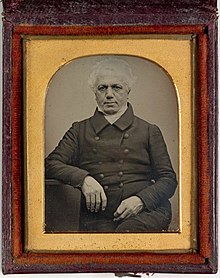William Bland
| William Bland | |
|---|---|

Dr William Bland c. 1845
|
|
| Born |
November 5, 1789 London, England |
| Died | July 21, 1868 (aged 78) Sydney, New South Wales |
| Cause of death | Pneumonia |
| Criminal charge | Manslaughter |
| Criminal penalty | Transportation |
| Spouse(s) | Sarah Henry Eliza Smeathman |
| Parent(s) |
|
William Bland (5 November 1789 – 21 July 1868) was a transported convict, medical practitioner and surgeon, politician, farmer and inventor in colonial New South Wales, Australia.
Bland was born in London, the second son of an obstetrician, Dr. Robert Bland.
In January 1809, Bland became a surgeon 5th grade aboard HM sloop Hesper where at Bombay, India he was involved in a wardroom argument with Robert Case, the purser. In the duel, which took place on 7 April 1813, Bland killed Case.
Bland was convicted of murder (as manslaughter) and transported to Van Diemen's Land (Tasmania) with a sentence of 7 years transportation, reaching Hobart Town of Tasmania aboard Denmark Hill in January 1814 and Sydney aboard Frederick on 14 July 1814 where he served at Castle Hill gaol for a short period of time. He was pardoned on 27 January 1815.
In 1818 he wrote "pipes" (anonymous and variously insulting satires) criticising Governor Macquarie's treatment of farmers, and making fun of his desire to have his name on foundation stones; the Governor was not amused. Bland's handwriting was recognised and on Thursday 24 and Friday 25 September 1818 he was in court and convicted of libel fined £50/-/-d and sentenced to 12 months imprisonment which he served at Parramatta, New South Wales.
In 1830 he actively opposed attempts to alienate large areas of crown land, and in 1831 joined the committee of the Australian Landowners Association to fight the Ripon land regulations.
In 1825 his committee founded Sydney Public Free Grammar School. The foundation stone of a new building was laid by the chief justice in 1830 and the Sydney College opened on 19 January 1835. Bland was treasurer from 1835 to 1844 and in 1845 became president, an office he held when the buildings were sold to the University of Sydney in 1853.
In September 1834 Sir Edward Lytton Bulwer, M.P., wrote from England that the Australian situation was not well understood in London. He suggested that an organised association should be formed, and that it should appoint a parliamentary agent for New South Wales. As a result, the Australian Patriotic Association was formed in 1835 by William Wentworth; Bland was its "chairman of the committee of correspondence" (i.e.: Secretary).
...
Wikipedia
